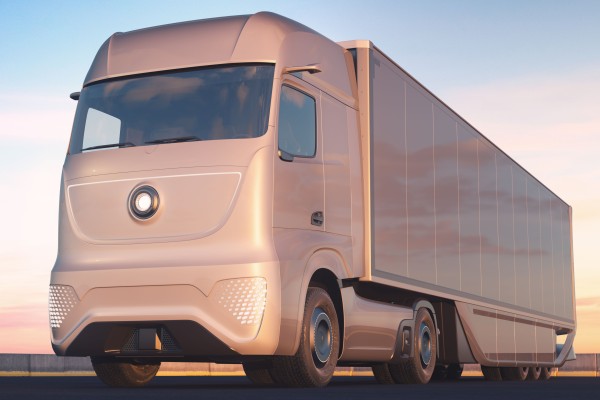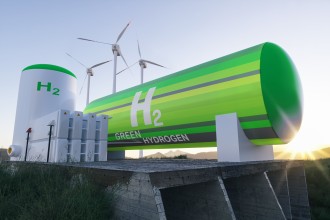-
-
2.1.Autonomous Truck
-
Since the beginning of 2024, the agricultural industry has been witnessing significant changes driven by new trends and advancements. This article will highlight developments, predictions, and innovations that companies should be aware of. While giving insight into how people's daily lives and the economy are impacted from these happenings.
What drives us to talk about supply chain technologies? ensun aims to speed up global business progress. Our web crawlers gather data, and our text-based algorithms organize it systematically. By combining our internal data with external sources, we offer insights into the latest technologies and spotlight the top innovators behind them.
For this report, we've analyzed over 1.649+ relevant companies within the supply chain sector.
But first, let us define what a supply chain is exactly. The NIST, a United States institution, defines it as a linked “set of resources and processes between and among multiple tiers of organizations, each of which is an acquirer, that begins with the sourcing of products and services and extends through their life cycle.”
With this in mind, let’s dive into forecasted developments for supply chain technologies.
Forecasted Developments for Supply Chain Technologies
The global supply chain management market size was valued at $15.85 billion in 2020 according to Statista. By 2026, the market is projected to reach nearly $31 billion, representing a compound annual growth rate exceeding 12%. As technology continues transforming supply chain operations, its role will become increasingly important.
Insights from KPMG Global provide guidance on generative AI's potential to reshape supply chain use cases. Before implementing, companies should evaluate analytics teams and data infrastructure to identify upgrades needed. A thorough data scan across manufacturing and distribution sites can uncover new AI opportunities by leveraging internal and external structured and unstructured sources. Issues once deemed too complex may suit generative AI's capabilities. Rising ESG expectations are increasing demand for AI solutions offering supply chain visibility into compliance. AI could help meet regulatory standards and consumer values for sustainability while enabling more productive, resilient, and environmentally conscious supply networks benefiting businesses, lives, and economies.
An interview with SAP's Darcy MacClaren by Techopedia discussed AI's potential to enhance risk management and decision-making through connected data collaboration. Vast data analysis may automate demand planning using AI models for higher forecasting precision. As MacClaren noted, AI stands to boost performance by reducing logistics costs while optimizing inventory and customer service levels.
Based on current industry trends, generative AI is expected to play a growing role in supply chain management over the coming years. By 2026, most large companies will likely have implemented generative AI solutions to improve processes like demand planning and inventory optimization through automated analysis of vast data sources. At the same time, growing customer demands for sustainability and transparency will increase pressure on companies to operate more responsibly. Generative AI has the potential to help address these challenges through applications that optimize carbon footprints and enhance traceability. As a result, AI is predicted to significantly transform how goods are moved globally. This will benefit customers through more resilient supply networks capable of ensuring consistent product availability even during disruptions. Broader economic and social benefits are also likely to emerge as critical resources remain accessible worldwide despite potential future crises.
Important Supply Chain Technologies and Their Top Innovators
Given the established connection between economic growth and the fueling of supply chain sector innovation, what exactly are some of these innovations beyond typical buzzwords? This paragraph aims to introduce several relevant topics gaining attention within the industry but not widely known publicly. At the same time, it will give recognition to leading companies in innovating each technological trend.
Let's examine some very promising technological directions receiving focused development currently within the supply chain sector.
Autonomous Truck
Autonomous trucks use technologies like sensors, radar, and computer vision to drive without a human at the wheel. This could change logistics by increasing efficiency and safety. Sensors monitor surroundings to detect obstacles and read signs, while systems control speed, braking and steering on highways. However, developing self-driving capabilities and achieving regulations will take time.
Once those challenges are met, autonomous trucks may lower costs via less fuel usage and ability to operate constantly without rest breaks. This could help alleviate driver shortages with remote monitoring. Initially, they may only operate on certain routes while transitioning, with humans as backups until proven reliable without interventions everywhere. Safety operators will likely remain until fully driverless operations are accepted.
Top Innovators
- Locomation is a top innovator known for developing autonomous vehicle technology to efficiently transport freight.
- EasyMile is a leading innovator in autonomous vehicle technology, providing software and complete solutions for driverless transport of goods and passengers deployed worldwide.
- Balyo is a leading innovator in autonomous industrial vehicles, developing navigation technologies that automate standard trucks and deploying robotic solutions worldwide.
Biodegradable Packaging
Biodegradable packaging breaks down into elements found in nature. It is produced from renewable resources like plants instead of fossil fuels. As it decomposes, biodegradable packaging does not pollute the environment in the long-term.
Reducing plastic waste benefits the planet. Biodegradable options help diminish non-degrading materials that persist indefinitely. However, specific conditions still require commercial composting rather than backyard methods. Continued innovation aims to expand biodegradable alternatives for all packaging types.
Top Innovators
- EcoVia is an innovative startup focused on creating compostable packaging from clothing waste to offer eco-friendly solutions that are beneficial for the environment.
- Bambax is an innovative sustainable packaging company that develops biotechnologies enabling circularity and carbon sequestration to replace plastics with compostable wood fiber packaging.
- GREENWEIMO is a global specialist and experienced manufacturer of plant-based compostable and sustainable packaging solutions from sugarcane with a large production capacity.
Blockchain Supply Chain
Blockchain supply chains use distributed ledger technology to track goods as they move between suppliers, manufacturers, distributors, and retailers. It allows all participants in the supply chain to view transaction records in real-time. Transparency and traceability are improved as each transaction is recorded on an immutable shared record.
By enabling transparency, blockchain reduces inefficiencies and the risk of fraud or counterfeits entering the supply chain. However, establishing blockchain networks requires substantial investment and coordination between companies. When successfully implemented, it can help build trust between supply chain participants and consumers. For example, companies use blockchain to trace food from farm to table to assure quality and origin.
Top Innovators
- Blockvision is an Italian startup using blockchain to make the fashion industry more transparent by enabling brands to trace their supply chains and issue Digital Product Passports communicating sustainable manufacturing processes to consumers.
- OpenLedger is a blockchain development company that leverages existing solutions and builds new decentralized applications to power partners' businesses, with a team of experts and a portfolio of released blockchain products and services.
- International Trust Machines (ITM) provides blockchain scaling solutions and ICs to enable real-time attestation of manufacturing data for assurance of trustworthy information.
Supply Chain Security
Supply chain security aims to protect the flow of goods, information, and finances within a supply chain from external threats. It works to ensure supply chain resilience and business continuity even in times of disruption. By implementing security measures at each step, vulnerabilities can be reduced and risks better managed.
However, a supply chain is only as secure as its weakest link, so collaboration is important. Comprehensive monitoring allows threats to be identified early. For instance, by digitally tracking shipments, companies obtain real-time visibility and alerts about delays or diversions can be sent. Still, 100% guarantees cannot be given, so flexibility and contingency planning remain essential.
Top Innovators
- aDolus Technology pioneers software supply chain security with FACT, offering automated SBOM generation and unparalleled visibility into software bits to safeguard critical systems.
- ALL ONE VIEW revolutionizes supply chain management by providing an innovative, integrated platform for security and full visibility, backed by years of expertise and a commitment to customer-centric solutions.
- DeepBits Technology pioneers software supply chain security with innovative binary and AI analysis techniques, seamlessly integrated into CI/CD pipelines to ensure compliance and mitigate risks.
Transportation Management System
A transportation management system (TMS) is a logistics technology that helps companies optimize delivery operations and plan efficient routes. By digitally managing freight, delivery windows, costs, and performance, a TMS brings visibility and control over transportation processes. It integrates with other systems like warehouse management to coordinate the entire supply chain.
A TMS automates tasks like load and route optimization, shipping rate quotes, dispatch, and track shipments electronically. This brings efficiency compared to manual methods. However, implementing a TMS requires investment and changes to existing workflows. When successfully adopted, it allows data-driven decisions, cost savings through improved asset utilization and service level monitoring. For example, tracking in real-time helps to proactively manage exceptions and delays.
Top Innovators
- Chorus Logistics stands out as a top innovator for its cloud-based transportation management solutions catering to diverse industry needs.
- Freight Genius revolutionizes logistics with an open API platform, ensuring seamless integration and empowering businesses with enhanced visibility and control.
- M2X pioneers the next generation of Transport Management Systems, catering to carriers and enterprise clients across various industries, promoting digital efficiency and sustainability.
Warehouse Management System
Warehouse management systems digitally manage key activities inside warehouses, such as receiving, put away, picking, packing, and shipping inventory items, allowing warehouse operations to run with increased accuracy and efficiency through automation and real-time visibility. By directing functions like automated storage and retrieval, inventory replenishment, and wave management through mobile devices to guide workers to the right locations for efficient picking, a WMS streamlines workflow.
To optimize space utilization, labor productivity, and order fulfillment, a WMS employs configurable rules and analytics, although set up and training first require time and resources. For example, some WMS use voice-directed picking which provides instructions to pickers to minimize errors, demonstrating how when implemented correctly, a WMS has the power to maximize warehouse performance.
Top Innovators
- Retail Technology Asia is dedicated to revolutionizing the retail sector through digital expertise, aiming to become a premier omnichannel platform, optimizing efficiency and customer service through innovative technologies.
- Aim2Tech excels in delivering swift, top-notch IT solutions globally, offering comprehensive support, app development, and digital marketing services to enhance online presence and achieve clients' goals.
- Foysonis is a cloud-based WMS, empowering modern warehouse operations with simplicity, real-time visibility, and organic scalability, backed by responsive customer support.
Navigating Technological Evolution
In conclusion, the article provides a comprehensive overview of the evolving landscape of supply chain technologies, highlighting forecasted developments, innovative trends, and top innovators across various sectors. From the transformative potential of generative AI in supply chain management to the emergence of biodegradable packaging and blockchain solutions, businesses are poised to leverage cutting-edge technologies for enhanced efficiency, transparency, and security. As the industry continues to evolve, collaboration, innovation, and a commitment to excellence will remain paramount in driving forward the future of supply chain management. But supply chain technology is not the only field evolving. Our B2B search engine unveils you suppliers for the exact technology you are looking for – globally and inter-industrial.
Start searching here now.
FAQ about Supply Chain Technologies
Supply chain technology is like a digital toolbox for managing the flow of goods, from the rawest material to happy customer. It uses things like smart trackers, data analysis and automation to make things faster, clearer, and less prone to surprises.
The arguably most important technologies in supply chain today are:
1. Artificial Intelligence (AI) & Machine Learning (ML): AI and machine learning are revolutionizing supply chains by enabling predictive analytics. This allows for better forecasting of demand, optimizing inventory levels, and even predicting potential disruptions before they happen. AI can also automate tasks like scheduling and route optimization, leading to greater efficiency.
2. Internet of Things (IoT): IoT connects physical objects to the internet, allowing for real-time tracking of goods throughout the supply chain. This provides greater visibility into inventory levels, location of shipments, and potential issues. IoT data can also be fed into AI systems for further analysis and optimization.
3. Cloud Technology: Cloud-based solutions offer increased scalability, flexibility, and accessibility for supply chain management systems. This allows businesses of all sizes to access sophisticated software without the need for expensive upfront investments. Cloud technology also facilitates collaboration between different players in the supply chain.
Enhanced Visibility: Real-time data tracking and analytics provide a comprehensive overview of the entire supply chain. Inventory levels, shipment locations, and potential disruptions become transparent, enabling informed decision-making and swift responses to challenges.
Data-Driven Decisions: Artificial intelligence and machine learning leverage vast amounts of data to forecast demand, optimize inventory management, and even predict potential disruptions. This proactive approach strengthens efficiency and allows businesses to stay ahead of the curve.
Automated Workflows: Technology automates repetitive tasks, streamlining processes and accelerating operations. From warehouse management to route planning, automation reduces manual errors and expedites the flow of goods throughout the supply chain.
By harnessing these technological advancements, businesses can achieve a more agile and resilient supply chain, ensuring on-time deliveries, reduced costs, and a competitive edge.
To enhance supply chain resilience, businesses should adopt three key principles. Firstly, diversification by sourcing from multiple suppliers and routes. Secondly, transparency through real-time data for quick problem identification. Finally, collaboration among all stakeholders to anticipate and adapt to changing circumstances
Quickscout
Looking for suitable
technology providers?
Start scouting!





